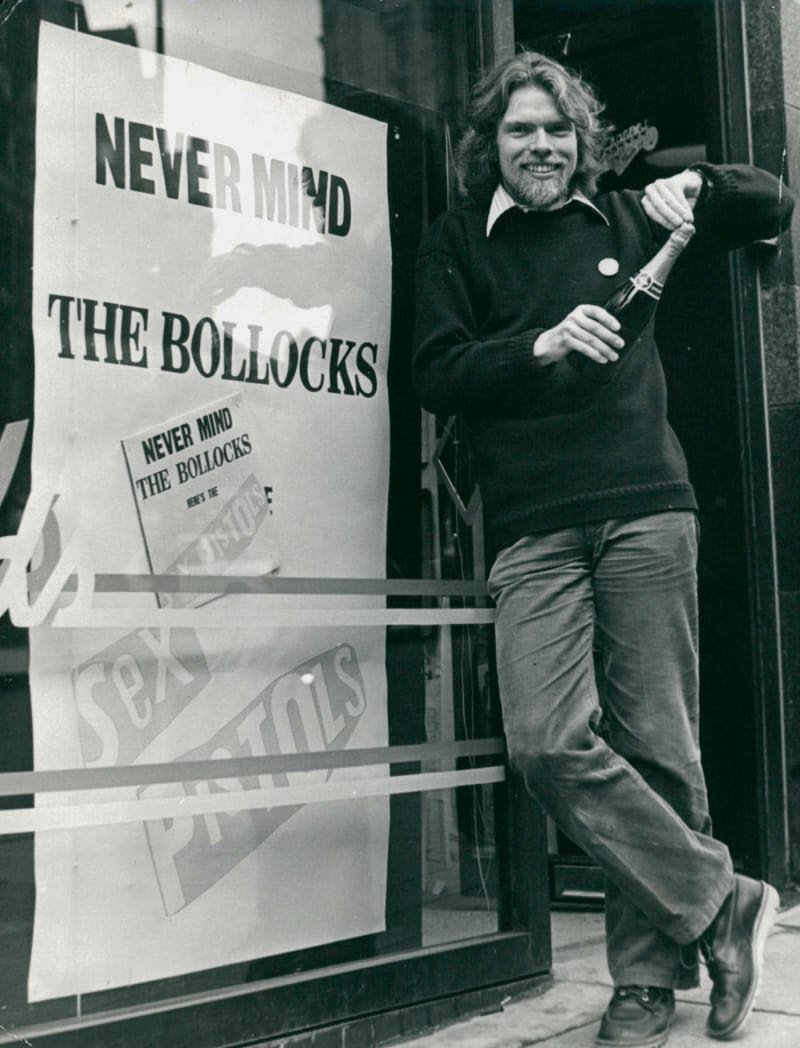Richard Branson and the Sex Pistols Disruption Doctrine
Sir Richard Branson in 1977 after signing the Sex Pistols to his startup record label, Virgin. Image from Virgin Records.
By 1977 the most notorious punk band on Earth, The Sex Pistols, was fired by their record label, banned from the radio, and barred from most music venues. With almost all of their revenue streams cut off, a fledgling independent record label, Virgin, led by a struggling, young magazine publisher named Richard Branson, decided to take them on.
Branson saw promise where others saw carnage. “They were electrifying onstage…. It was extraordinary - disruptive, powerful.” he would recall later.
After he signed them, he chartered a boat to take the same route as the Queen’s Jubilee procession along the Thames in London. When the boat coasted underneath London Bridge, Branson saw a police patrol. He cranked up the volume and had the band play “God Save The Queen/ The Fascist Regime.” Ten officers raced to the vessel and started beating on the members of the band with their batons. A crowd started to form and journalists started snapping pictures.
Sex Pistols lead singer John Lydon in police custody. Photo credit: NME
As the incident dominated the headlines record sales for The Sex Pistols quintupled. The band created a pseudonym, The SPOTS (for The Sex Pistols On Tour Secretly) and had the highest grossing tour in the UK that summer.
Richard Branson is now worth an estimated $7bn. Virgin is a business empire which includes music, banks, airlines, trains, and civilian space travel. But the Sex Pistols is where it all began, and their fingerprints can be found on everything he’s touched since.
Here are a few of the actionable pillars of a punk brand.
F**k you I won’t do what you tell me.
The Sex Pistols captured a seething, mostly silent, national resentment at the opulence of the Royal Family while the streets of London overflowed with sewage and rats because of a sanitation workers strike. Inflation and unemployment were at an all time high. “God Save The Queen/ The Fascist Regime'' screamed a sense of rage that many British citizens dutifully repressed.
A punk brand is a brash middle finger toward an authority that is rife with hypocrisy. People who may not like the product will still say “It’s about time someone said that out loud.” Its audacity is galvanizing.
Apple’s “I’m a Mac, and I’m a PC” campaign, and SodaStream (banned from the Super Bowl by Coca Cola) are a few hugely successful brands that followed the Punk ethos of speaking truth to power.
Richard Branson gets repeatedly arrested or fined for the bombastic techniques he uses to launch Virgin brands. Defiance begets dollars.
When it’s done well, it gives voice to repressed indignation about injustice.
Punk is an act of love - not war.
There’s a good reason why people are still energized by the Sex Pistols and most people have never heard of GG Allin. (Another early punk musician whose on-stage antics were psychotic.) The Sex Pistols gave voice to a nationally repressed anti-authority sentiment. GG Allin, on the other hand harmed himself and others on stage, in service of no greater cause. There’s a difference between purposeful punk and creating a spectacle.
A punk brand must speak (scream?) with justified authority. U2, which began as a Ramones cover band, has always had a cause. Nike throwing its support behind Colin Kapernick after he was banished from the NFL is another example.
Even Anthony Bourdain, a celebrity chef and cultural commentator had a purposeful punk brand: “when you sit down and eat with people in any corner of the world you will see a common humanity that is distorted by political forces that divide us.” He conveyed through his shows “Parts Unknown” and “No Reservations.”
Be a mensch, not a monster.
Former employees speak about Richard Branson as caring and compassionate. This seemed to be his secret superpower for taming the Sex Pistols. The band treated him as a surrogate dad and psychologist. Sid Vicious, the band’s violent, heroin-addicted bass player would hang out in Branson’s office just to talk and decompress. He respected and listened to him.
The psychological leadership style of Branson is the exact opposite of Elon Musk, even though both are pioneers of civilian space travel. Musk can be cruel and intimidating, where Branson is compassionate and empowering.
This gels with my experience growing up in NYC’s punk scene in the 90s. CBGBs was a loving sanctuary where everything that made you undateable in high school was celebrated. In business, I’ve found that the most innovative, transformative leaders create a sanctuary where the most visionary, impactful workers can show up to a place like Bloomberg or PWC, and do the best work of their lives, even though the company wasn’t a fertile garden where innovation could flourish.
If I could wave a magic wand, the mensch paradigm of innovation leadership would be more prevalent.
The whole article in one paragraph
Richard Branson understood that a punk brand was applicable far beyond his first entrepreneurial endeavor with The Sex Pistols. A punk brand commands attention by rallying a community around a cause. It’s constructively provocative and sees value in triggering a strong counter attack. And, at its best, it is led by someone who can control its combustible elements through compassion.
Come hang out with Punks & Pinstripes on November 6th, in NYC for a book-burning party with Stephen “Shed” Shedletsky at one of the quirkiest secret bars in New York. We won’t actually burn books. We will talk about how to create a culture of courage inside an organization dominated by fear. RSVP here


